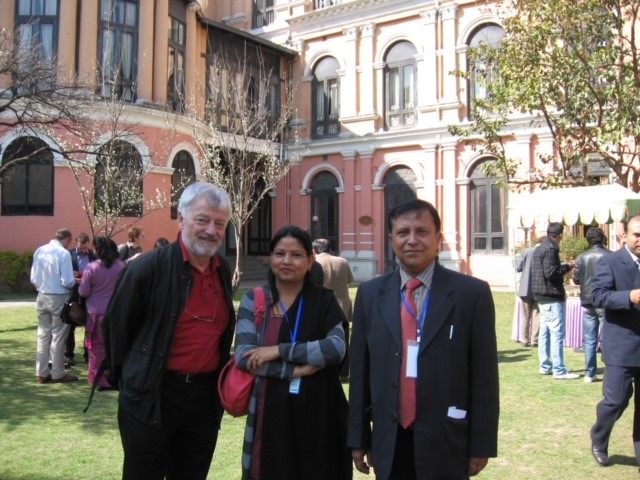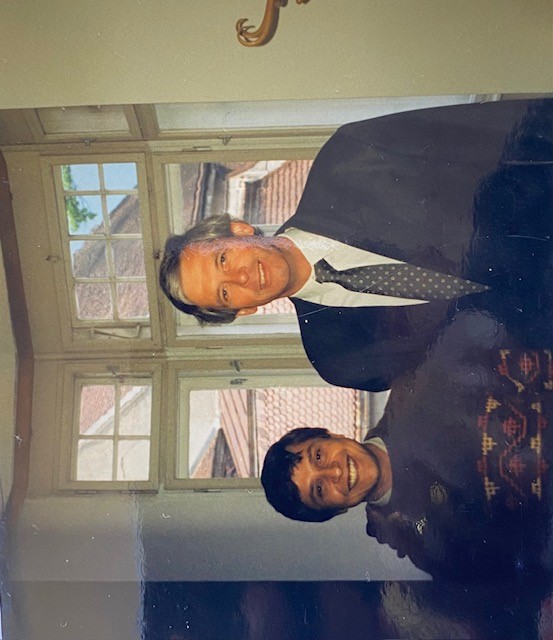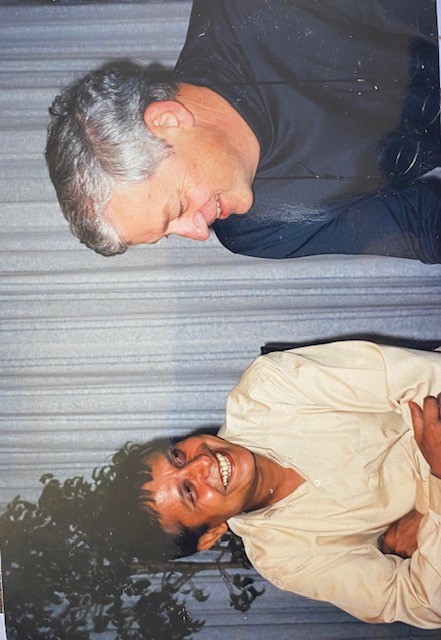

It is always great news when former scholarship holders keep close relations with Austria and build a successful career in their country of origin. The latest news has reached us from Prof. Dev Raj Adhikari, who is a former OeAD North South Dialogue scholarship holder.
He completed his master’s in business administration, Commerce and Public Administration at Tribhuvan University in Nepal and came to the University of Innsbruck for his Doctorate in Human Resources Management from 1989-1992. During his stay, he immersed himself in the higher education culture in Austria, which in turn influenced his further career in various ways, and until today he is still in close contact with his former supervisors Prof. Stephan Laske, Prof. Franz Strehl and Katja Laske.
Following his successful stay in Austria, Prof. Adhikari was appointed professor at his Alma Mater, Tribhuvan University, and went on to holding several postdoc positions in Japan, China and Canada. He also returned to Austria a few times. Looking back on a long career at his university and an overall teaching experience of 37 years, he has also worked at different enterprises such as the Nepal Bank and the Nepal Insurance Company.
He has recently been appointed Chairman of the University Grants Commission (UGC, see www.ugcnepal.edu.np) in Nepal for the next four years. The University Grants Commission (UGC) was established to promote, facilitate, support, and enhance the quality of higher education in Nepal and plays a crucial role in governing every national university in the country.
As busy as he may be in his new position, he still publishes articles, supervises PhD students, and works as a coordinator in different committees to help universities realize various projects. His articles mainly deal with sustainable development. For instance, his most recent ones analyse the current state in incorporating sustainable development goals at Nepalese universities or the knowledge management initiatives for achieving sustainable development goal 4.7. You can find a few of his publications here. In addition, he has published books on Human Resource Management.
We asked Dr. Adhikari a few questions on his educational/academic background and how his scholarship stay influenced his career.
Tell us briefly about your studies: Why were you interested in your chosen field of study and what was your vision back then?
I wanted to become a university professor as soon as I started teaching at the university. I made my first attempt to apply for a position at a university and was hired as assistant lecturer at Tribhuvan University's main campus. when I first started at the university, I had the chance to connect with my seniors, who had earned their PhDs from other universities I was planning to start my doctorate as soon as feasible while teaching human resource management at my institution. The doctorate proposal was delivered in person to the Austrian Embassy in New Delhi. I found out that the Austrian government would give me a fellowship to pursue a Doctorate at the University of Innsbruck two years after I submitted my application. With the motivation of my supervisor Prof. Dr Franz Strehl (Head of the Institut für Verwaltungsmanagement), I decided to write my dissertation on job design in Nepalese public Enterprises (a major aspect of human resource management). Prof. Stephan Laske was my next supervisor and helped me a lot with my PhD research. Without the motivation and support from these two professors, it would have been really hard to complete my studies. To be honest, both of them have had a great impact not only on my academic achievements but also on my future. They enlightened me in my area of study and enabled me to become an independent researcher. I am indebted to them. The fellowship from the Austrian government and regular support from the OeAD and its staff as well as occasional visits to and outside of Austria (within Europe) helped me to understand European etiquette and culture and support my academic exposure. I never thought that I would meet such helpful university colleagues as Kurt Pomberger, Manfred Auer, Heike Welte, and a few others whose names I now forgot. All of them are in my memory. Similarly, I had the opportunity to make new friends like Walter Stockl,Johnney, Edit, Heribert Holzinger, Helga, and many more who have become family friends. Later on in this year, I will have completed my post-doctoral research under the exclusive supervision of Prof. Stephen Laske.
Which impact did your education/scholarship in Austria have on your personal and professional development? How did your studies in Austria change or influence your life?
Huge impact on my career in Nepal, professionally and personally. For a Nepali, it would have been difficult to study without the support of the Austrian scholarship. This fellowship provided me with the opportunity to study in a very different environment. The research and learning environment, library facility, access to current / the most recent literature, and support from university professors and colleagues motivated me to concentrate and speed up my study. Later on, it helped a lot to shape my career onto the right track. It is extremely difficult to express in a few words how my studies changed or influenced my life. Just to say that what I am today, professionally and personally, is because of the University of Innsbruck and the support of my professors and colleagues. With this support I received from the OeAD, I have since guided dozens of PhD and MPhil students from Tribhuvan University. Even though I accompanied one of my PhD students to the University of Innsbruck to undertake his literature survey with the help of an OeAD scholarship, they have already awarded PhDs from Tribhuvan University, Nepal.(Could you please explain this further, are they doing two PhDs?)
Are you still in touch with other Nepalese students who studied in Austria with an OeAD grant?
Yes, I have been in contact with some of the Nepalese professors who completed their doctoral and/or post-doctoral studies in Austria under OeAD grants.
What kind of networks or cooperation have you been able to establish between your home institution and the host institution in Austria?
I still have a few students doing PhDs under my supervision. I am keen to develop relations with universities in Austria, especially to conduct joint postdoctoral research and send a few of my students there for literature reviews and seminars. I have also worked as visiting professor three times, travelling from Nepal to teach students at the University of Innsbruck.
Which experiences were particularly important for you? Is there any interesting anecdote or story you would like to share?
I experienced a lot of things while studying in Austria. At the University of Innsbruck, I had some particularly exciting experiences, like how university professors keep themselves busy with teaching and research, I experienced there that they have separate rooms, and each professor has their library in their room. The facilities and opportunities that universities provide to their faculties were awesome. Regarding the story, I very much liked the Altstadt of Innsbruck. I wanted to experience what the Altstadt looks like from the balcony of the Goldenes Dachl. Dr Katja Laske (the wife of Professor Stephan Laske) helped me to fulfil this wish. She spoke to the head of the Goldenes Dachl, got permission, and brought me up to the balcony of the Goldenes Dachl.
What are your plans for your current position? What will the University Grants Commission look like in 3-4 years?
We have been facing several challenges in higher education (HE). Some of these are the declining numbers of students in HE, the development of teachers’ capacities to undertake research, designing market-relevant curricula, and optimising the utilization of tax money when financing higher education. Although I have more responsibilities, I plan to focus on these challenges and expect to make HE in Nepal a more competitive and attractive place for students, teachers, and administrative staff in the forthcoming years.
The OeAD congratulates Prof. Adhikari once again and wishes him great success in this new position!


